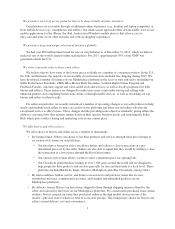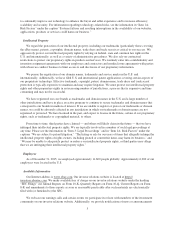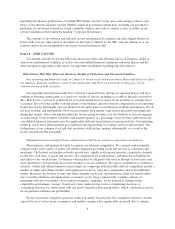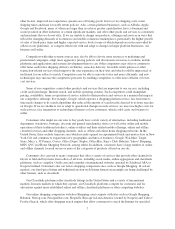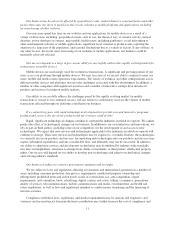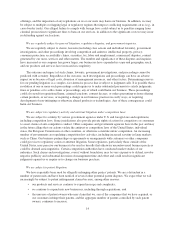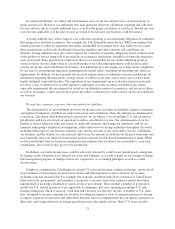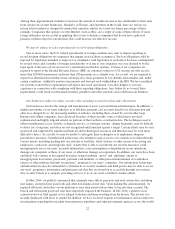eBay 2015 Annual Report Download - page 24
Download and view the complete annual report
Please find page 24 of the 2015 eBay annual report below. You can navigate through the pages in the report by either clicking on the pages listed below, or by using the keyword search tool below to find specific information within the annual report.doing business. Any such costs, which may rise in the future as a result of changes in these laws and regulations
or in their interpretation, could individually or in the aggregate make our products and services less attractive to
our customers, delay the introduction of new products or services in one or more regions, or cause us to change
or limit our business practices. We have implemented policies and procedures designed to ensure compliance
with applicable laws and regulations, but there can be no assurance that our employees, contractors, or agents
will not violate such laws and regulations or our policies and procedures.
Regulation in the areas of privacy and protection of user data could harm our business.
We are subject to laws relating to the collection, use, retention, security, and transfer of personally
identifiable information about our users around the world. Much of the personal information that we collect,
especially financial information, is regulated by multiple laws. User data protection laws may be interpreted and
applied inconsistently from country to country. In many cases, these laws apply not only to third-party
transactions, but also to transfers of information between or among ourselves, our subsidiaries, and other parties
with which we have commercial relations. These laws continue to develop in ways we cannot predict and that
may harm our business.
Regulatory scrutiny of privacy, user data protection, use of data and data collection is increasing on a global
basis. We are subject to a number of privacy and similar laws and regulations in the countries in which we
operate and these laws and regulations will likely continue to evolve over time, both through regulatory and
legislative action and judicial decisions. Some of these laws impose requirements that are inconsistent with one
another, yet regulators may claim that both apply. Complying with these varying national requirements could
cause us to incur substantial costs or require us to change our business practices in a manner adverse to our
business and violations of privacy-related laws can result in significant penalties. In addition, compliance with
these laws may restrict our ability to provide services to our customers that they may find to be valuable. A
determination that there have been violations of laws relating to our practices under communications-based laws
could expose us to significant damage awards, fines and other penalties that could, individually or in the
aggregate, materially harm our business. In particular, because of the enormous number of texts, emails and other
communications we send to our users, communications laws that provide a specified monetary damage award or
fine for each violation (such as those described below) could result in particularly large awards or fines.
For example, the Federal Communications Commission amended certain of its regulations under the
Telephone Consumer Protection Act, or TCPA, in 2012 and 2013 in a manner that could increase our exposure to
liability for certain types of telephonic communication with customers, including but not limited to text messages
to mobile phones. Under the TCPA, plaintiffs may seek actual monetary loss or statutory damages of $500 per
violation, whichever is greater, and courts may treble the damage award for willful or knowing violations. We
are regularly subject to class-action lawsuits, as well as individual lawsuits, containing allegations that our
businesses violated the TCPA. These lawsuits, and other private lawsuits not currently alleged as class actions,
seek damages (including statutory damages) and injunctive relief, among other remedies. Given the enormous
number of communications we send to our users, a determination that there have been violations of the TCPA or
other communications-based statutes could expose us to significant damage awards that could, individually or in
the aggregate, materially harm our business.
We post on our websites our privacy policies and practices concerning the collection, use and disclosure of
user data. Any failure, or perceived failure, by us to comply with our posted privacy policies or with any
regulatory requirements or orders or other federal, state or international privacy or consumer protection-related
laws and regulations could result in proceedings or actions against us by governmental entities or others (e.g.,
class action privacy litigation), subject us to significant penalties and negative publicity, require us to change our
business practices, increase our costs and adversely affect our business. Data collection, privacy and security
have become the subject of increasing public concern. If Internet and mobile users were to reduce their use of our
websites, mobile platforms, products, and services as a result of these concerns, our business could be harmed.
As noted above, we are also subject to the possibility of security breaches, which themselves may result in a
violation of these laws.
12



